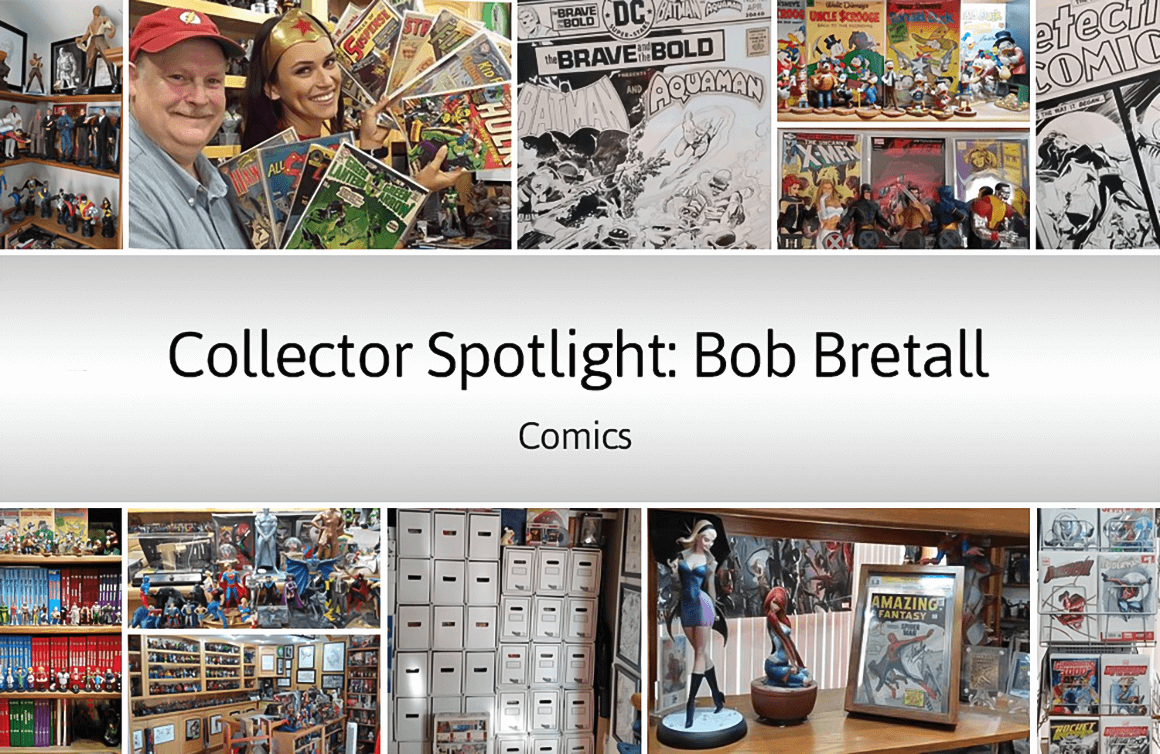Describe your collection.
I collect comics. My collection includes over 105,000 unique comics and is recognized by Guinness World Records as the world’s largest collection. I’ve increased my collection by more than 3000 comics since their official count over three years ago.
When and why did you start collecting?
I’ve been collecting comics since July 1970. My two older brothers read comics, so comics were always around the house growing up. They liked Richie Rich, Uncle Scrooge, and Hot Stuff. When I was eight-years old, I purchased the first comic of what would become my collection: Spider-Man #88 by Stan Lee and John Romita Sr. I loved the cover art of that comic and went back week after week for the latest issue.
It’s the characters and stories that attract me to comics. Stan Lee in particular; he never dumbed things down for young readers. I learned a lot from comics. I often had to use the dictionary to find out the meaning of a word. We covered things in school that I was already familiar with through reading comics. Marvel characters were very interesting to me. Marvel characters are people with problems who happen to be superheroes. Peter Parker was concerned with being able to afford Aunt May’s medicine. DC Comics’ characters are bigger than life: a millionaire, an Amazon princess – those stories didn’t hold the same appeal for me.
These days, I read fewer superhero comics, as I’ve grown to appreciate indie comics. Many people still associate comic books with superheroes, but don’t forget that Men in Black and A History of Violence were based on comic books. There are many types of stories being told through the medium.
How do you display and store your collection?
I store my collection in long boxes in my garage. I live in Southern California, so the temperature and humidity are fairly consistent. The garage is well sealed and doesn’t have windows. My comic book room sits above the garage. It’s done up with comic art on the walls, bookcases with collected editions, and lots of comic-book related statues on display. I keep the comics I’m reading or have yet to read here. Once I read them, they go into long boxes, and, hopefully into my database before too long. Then I move the boxes down to the garage for permanent storage.
I use ComicBase to catalogue my collection. It helps me track the entire collection and I use it to find which box any particular comic is in when I need to.
What do you consider to be the Holy Grail of comics?
Amazing Fantasy #15 is my most prized comic because it features the first appearance of Spider-Man. As for one that I don’t have in my collection, Fantastic Four #1 would be nice. It is the first ever Marvel superhero comic.
What advice would you give to someone interested in starting a collection?
A couple of things. First, decide why you want to collect. Is it an investment or do you love something about a comic(s)? Secondly, collect in a way that makes you happy. Figure out the characters, artwork, and stories that interest you. I know people who only collect Disney comics or stories that include Batman. Whatever makes it interesting for you, buy those.
There’s a cost to collecting. Some people only collect high-grade comics; those in excellent condition. They come at a cost. I’m a collector and a reader of comics so my collection consists of mid-grade condition comics – those whose condition is very good to fine. They may have a bend or a wrinkle, but I’m okay with that.
I don’t focus on the value of my collection or talk about the specific dollar value of comics. I collect because I still love to buy and read comics; it’s not about the money for me. I’m not selling my collection. I still read about 100 comics each month. I’ve had a few people ask me where I get the time and money to read that many. Sports fans watch games for hours each week. If you golf, you have the equipment and green fees. It’s the same thing.
What resources do you use to acquire knowledge about comics and connect with other collectors?
Lots of places. I continue to learn new stuff from Facebook groups and other online communities. Each group has its own focus. I sometimes leave groups if all they talk about is the monetary value of comics. There are blogs and podcasts focused on comics. I recently came across The Bronze Age of Blogs because someone on a Facebook group mentioned it. It has a post about a Tales of the Zombie story from Marvel in the 1970s that was never published.
And don’t overlook publisher websites. Marvel and DC Comics both have great educational content that includes interviews with creators and artists.
Stay connected to ComicSpectrum – Bob’s own comic-focused website – to nurture your comic knowledge.
Drop us a line to let us know about your collection of vintage toys and/or games. We just may feature your collection!

